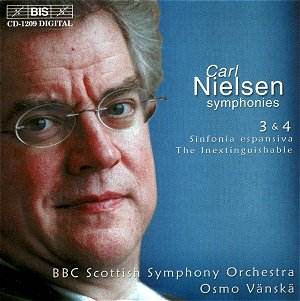The Scottish National Orchestra (now the RSNO) under
Alexander Gibson were moderately active during the 1960s and 1970s with
some good Sibelius on Saga. Chandos and Neeme Järvi propelled them
into the international market. However their BBC colleagues had little
or nothing of a profile commercially until Hyperion began to use them
extensively for the Romantic Piano Concerto series and then with increasing
frequency in other projects such as the Cecil Coles CD and the wonderful
Bortkiewicz symphonies.
Bis began some time ago to sit up and take notice and
have already used the BBC Scottish for various of their Macmillan series.
Now BIS are freshening their Nielsen catalogue with what will be a complete
cycle at a time when the world is raining such cycles. The competition
is numerous and strong: Blomstedt (San Francisco, Decca), Schønwandt
(Dacapo), Schmidt (Regis), Chung and Järvi on Bis, Penny (Naxos),
Bostock on ClassicO, Berglund on BMG, Bernstein/Ormandy on Sony, historic
Danish recordings on Danacord and so on. Vänskä has already
launched the series with the pairing beloved of Ormandy and so well
done by him with the Philadelphians: the first and the last symphonies
(BIS-CD-1079).
Bis are up against it from the 'enemy within'. Their
recording of Espansiva with Chung remains a non-pareil in
my book. I consider it the best of Chung's partial cycle. Chung's has
openness and power and the recording is superb with a startlingly natural
sound combined with galvanic playing. Vänskä and the Scots
are faster, finding more abandoned fury in the first movement; so much
so that the wheels are close to coming off the axles at one point. The
brass is rendered with just as much gutsy bloom and rasp as in the Chung
and they do sound wonderful in the finale. So go for this if
you like a volcanic approach - Mravinsky but without the Maserati of
the Leningrad PO - instead a top of the range Jaguar. By contrast the
vocalising but non-sensual soprano and baritone roles are effacingly
balanced to a greater extent than I recall from any other recording.
Vänskä delivers a smashing blow to launch and loft the Inextinguishable.
Though Vänskä keep feeding massive draughts of oxygen into
the furnace his orchestra responds with virtuoso technique keeping better
control than in the first movement of 'their' Espansiva. I find
myself having written much about the high octane side but tender expression
is rendered with fidelity too as in the finale of the Fourth at 3.12
(tr.8) where the pp violins are precise and caressing. My reservations
are quibbling but I felt, rather than could measure, some slackening
in the impelling forward power in the finale of the symphony. This very
subjective impression applies only to the Inextinguishable and
is a matter of slight shading rather than dramatic attention.
Good to excellent performances, extremely well engineered.
For Espansiva you should still prefer Chung over this and consider
Schmidt and Bernstein. In the Fourth Vänskä's main competition
is from Schmidt and Schønwandt.
Rob Barnett

